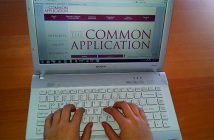
A study recently released by the National Bureau of Economic Research suggests that assigning random seats can significantly reduce the amount of cheating that takes place among college students.
According to the study, at least 10% of undergraduates enrolled at a “top American university” cheated during a test. However, after students were assigned random seats, that number dropped to almost zero.
The authors of the study, Ming-Jen Lin of the National Taiwan University and co-author of “Freakonomics” and University of Chicago professor Steven Levitt were brought into the unnamed “top American university” in 2012 after a professor had two students come forward complaining about cheating on an exam.
The authors found that instances of incorrect answers were much higher among students sitting next to each other when they were allowed to choose their own seats. The authors suggest that the correlation was far higher than it would have been if left up to chance, causing them to believe the students were copying off of each other.
The correlation dropped after students were randomly assigned to new seats.
Of the 242 students in the class, the authors found 12 they suspected of cheating. Of that group, 4 confessed to doing so. A student judiciary court hearing had been planned as a result, but did not happen due to “pressure from parents,” according to the report.
“Perhaps the best supporting evidence for our claims of cheating (and also, perhaps a powerful explanation as to why so little effort is invested in detecting cheaters), comes from what happened after we carried out our analysis,” Levitt and Lin write.
The grades of the 12 students found to be “most suspicious” were withheld until the first day of the following semester causing those students to be disqualified from receiving academic scholarships. Despite this, “none of the 12 accused students complained or sought redress,” writes Karla Bowsher for MoneyTalks News.
In addition, researchers discovered that when students were assigned random seats for the final exam, which was proctored by three additional faculty members, instances of cheating almost completely disappeared. In order to do this, Lin and Levitt initially allowed students to choose their own seats. The pair noted who the students chose to sit next to, and then re-assigned students to random seats.
“Thus, we are able to observe the patterns in correlations among students who wanted to sit together, but then were not allowed to,” they noted. They added, “When seating positions were randomly assigned and monitoring was increased for the final exam, almost all evidence of cheating disappears.”
Similar findings resulted from a 2005 survey in which 11% of the 8,000 college students in the United States and Canada who participated admitted to copying another students’ paper.




